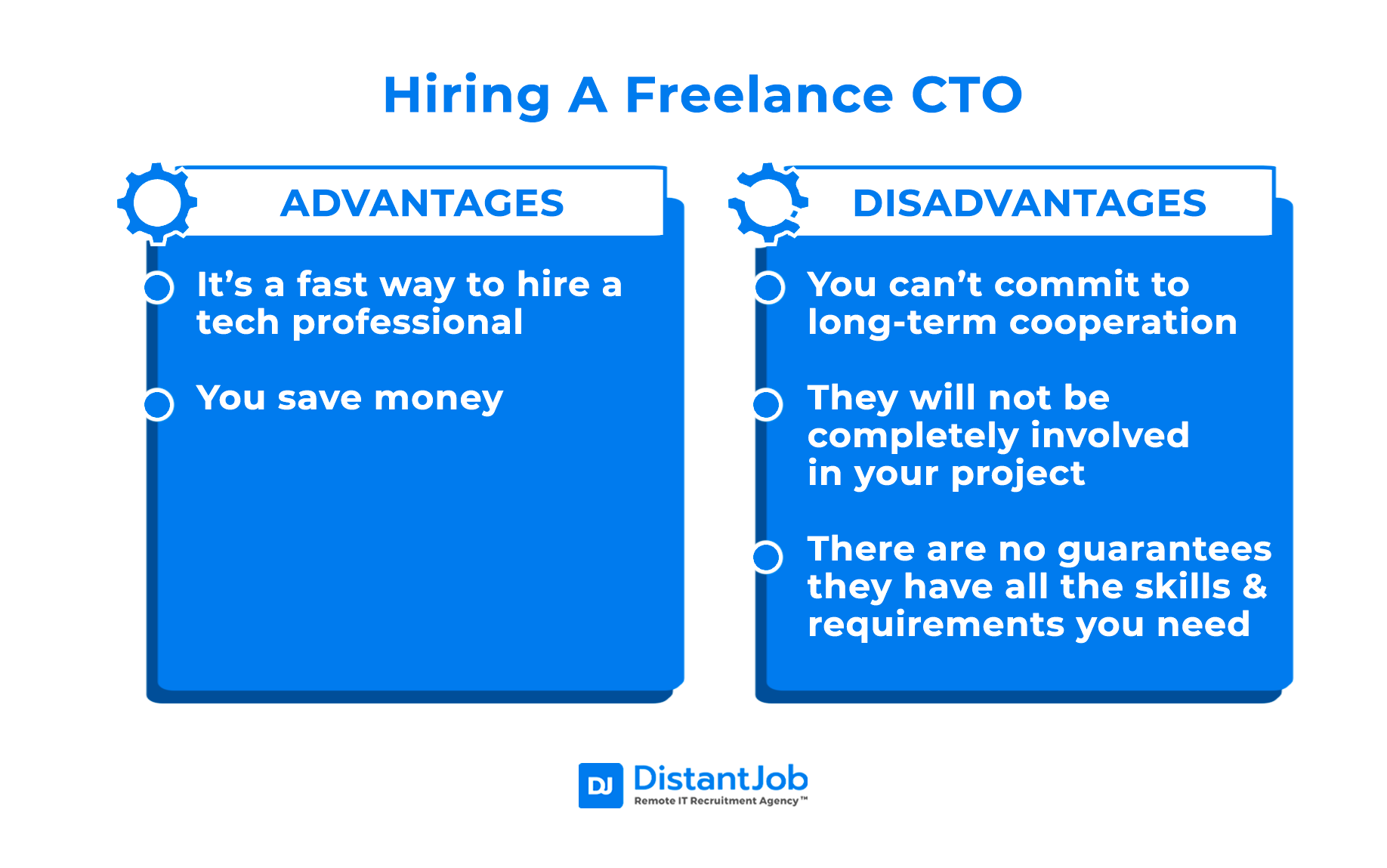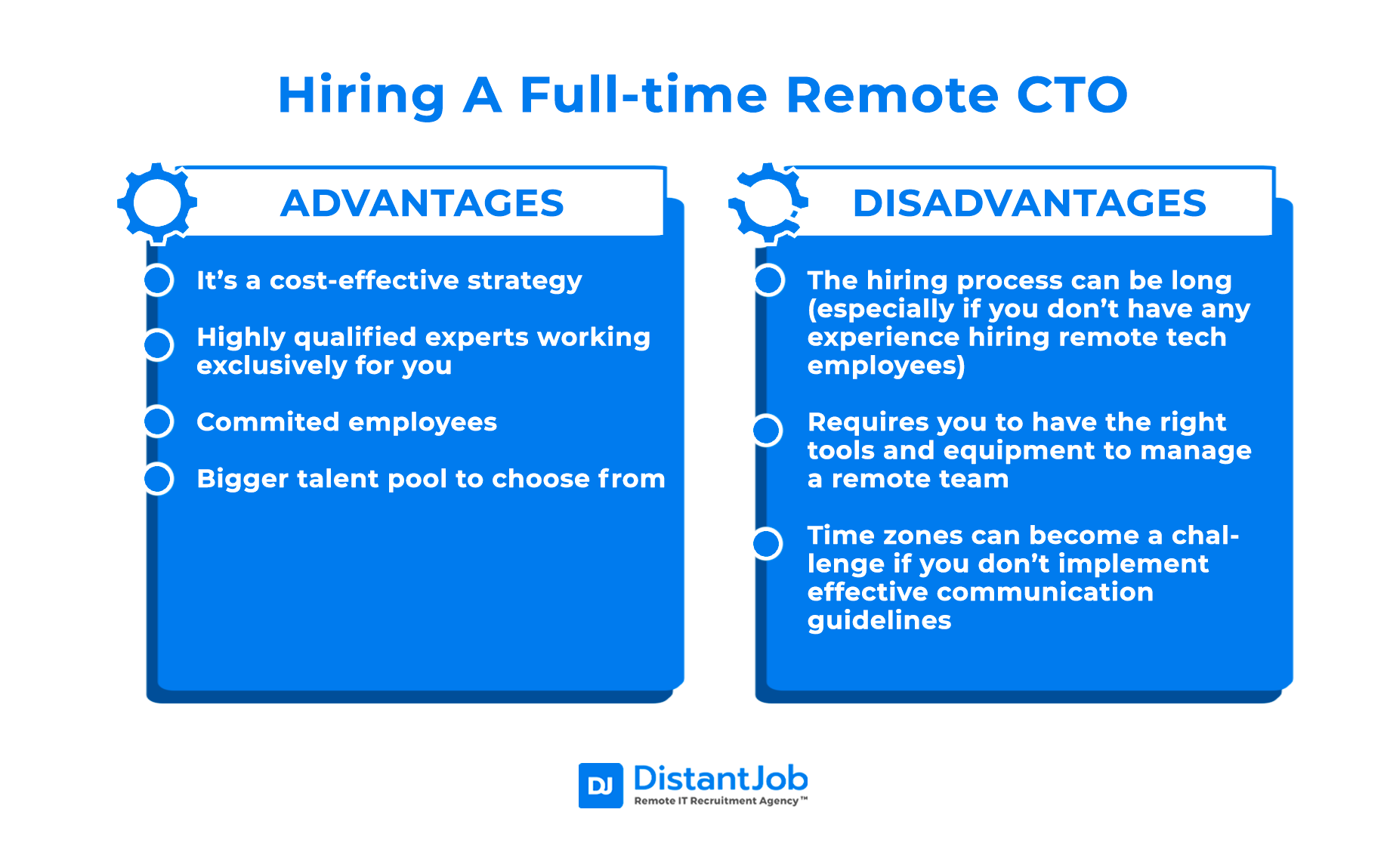Navigating a tech startup without a solid tech background? It’s like sailing into a storm without a compass. Trust me, I’ve been there. It’s not enough to have a killer app idea; the real game-changer is how you manage your tech team. That’s where a top-notch Chief Technology Officer (CTO) comes in. Think of a CTO not just as a hire, but as a co-pilot who can marry your groundbreaking vision with the right tech prowess.
Here’s a fact to chew on a survey by STXNext found that 51% of CTOs are now pivotal in startups, steering tech development and supercharging business growth. That’s no small feat.
So, if you’re a founder without deep tech chops, hiring a CTO isn’t just another line item in your budget—it’s a strategic investment. It’s about elevating your business to dominate in today’s fast-paced digital race. Keep reading to discover the real deal about what a CTO brings to the table and how to hire the best one for your startup. After all, your business deserves to not just survive but to thrive.
What is a CTO?
A Chief Technology Officer (CTO) is a technology expert who provides strategic guidance, aligning technology initiatives with the overall business goals and objectives. Their main purpose is to drive innovation and ensure the effective use of technology resources.
Unlike a traditional CTO who holds an on-site position within an organization, a virtual CTO operates remotely, leveraging digital communication tools and technology to perform their responsibilities seamlessly.
What does a CTO do? From strategy to tech implementation, here are some key responsibilities of a remote CTO:
- Technology Strategy: A remote CTO defines and implements the technology roadmap for organizations.
- Innovation and Digital Transformation: Explore opportunities for business growth and efficiency through technology adoption.
- Technical Leadership: A virtual CTO provides technical leadership and guidance to the development team, ensuring all projects are aligned with industry best practices and standards.
- Vendor Management: Engage with external vendors and partners, evaluate and select technology vendors, negotiate contracts, and manage ongoing relationships to ensure the organization has access to the right technology resources.
- Security and Risk Management: Develop and implement robust security measures, policies, and procedures to protect the organization’s data and infrastructure from potential threats.
- Team Development: A virtual CTO may also be involved in recruiting and mentoring technical talent, ensuring that the organization has the right skills and expertise to execute technology initiatives successfully.
Two of the main aspects to look for when hiring a CTO for your remote project are education and professional experience.
In a study by Agile8, the world’s best CTOs (from Apple, Facebook, and Amazon, among other companies) spent 24 years shaping their careers before obtaining the role. On average, they worked in 4 companies and had a total of 8 positions.
6 Simple Steps for Hiring a Remote CTO
- Understand Your Startup’s Technology Vision
- Identify Technical Requirements
- Scalability and Flexibility
- Evaluate Your Hiring Practices
- Leverage Startup Networks and Communities to Find Talent
- Conduct In-Depth Interviews And Technical Assessments
1. Understand Your Startup’s Technology Vision
Before starting the recruitment process to hire a CTO, your first step should be figuring out if you need one. In other words, understand your business’s needs and see if they align with what a CTO offers. It might happen that you just need to hire a senior developer instead.
Start by clarifying your startup’s overall vision and goals. Identify the specific ways in which technology will support and enhance your startup’s mission.
Consider factors such as:
- Product development
- Scalability
- Market expansion
- Customer experience
By aligning your technology vision with your startup’s overarching goals, you can ensure that your remote CTO will contribute to and not hinder your business’s success.
Another aspect I always advise clients on, especially those who already have a team of software engineers, is to evaluate if there is someone on the team who could be a good fit for the CTO role. This can bring great value, and as they are already involved in the company, they understand the team’s dynamics and culture.
But, if this is not your case, follow the next steps.
2. Identify Technical Requirements
In line with the previous step, hiring a CTO is a great idea to visualize your plans. Having a vision of where you want to be in the following years will help you understand how the role of a CTO fits into this plan.
Before crafting the general skills, evaluate your company’s needs, those that “every” remote CTO needs to understand. Evaluate your project:
- What needs to be done to have a successful project – product?
- What skills does your new CTO need to have to fulfill those needs? (Keep in mind they will perform in a remote environment)
- What does your 3-, 5-, or 10-year plan look like? What value can a CTO add to it?
- What are the SMART (Specific, Measurable, Achievable, Realistic, Timely) goals for this role?
These types of questions help you craft the ideal skill requirements for the position. While certifications and degrees don’t always translate into experience, it’s valuable to look for someone who is constantly upgrading their knowledge.
Once you have evaluated the skills you need your CTO to have that align exclusively for your startup, these are other – more general – skills to keep into account:
| Hard Skills | Soft Skills | Educational Background |
| Project planning (Being skilled in Scrum, Agile, Kanban, and other project management techniques) | Leadership | Bachelor’s degree in a technology-related field |
| Strategic knowledge (They need to be able to choose which technologies will be used in the products, the languages, and developing strategies) | Communication | MBA (Master of Business Administration) |
| Technical knowledge (Database management, network security, data mining, mobile development, storage systems and management, programming languages, statistical analysis) | Strategic thinking | Training in IT governance, ethics, compliance, project management, risk management, intellectual property rights, or information security, among other things. |
| Business administration expertise | Problem-solving | Software and project management certifications |
| Conflict and crisis management | ||
| Visionary (and the ability to execute their vision) |
3. Scalability and Flexibility
When hiring a remote Chief Technology Officer for your startup, prioritize versatility and adaptability. Startups operate in a fast-paced environment where priorities can change rapidly, making it essential to find a CTO who can handle a wide range of tasks beyond their core technical expertise.
Look for candidates who can seamlessly transition between different roles and are comfortable taking on new challenges as they arise.
Adaptability is equally important, as startups are known for their agility and ability to pivot quickly. Your remote CTO should be open to new technologies, methodologies, and innovative solutions.
Seek candidates who have a proven track record of quickly learning and implementing new tools and techniques, as well as those who have experience working in startup environments and can navigate the challenges associated with startup growth.
Prioritizing versatility and adaptability ensures that your remote CTO can handle the dynamic nature of a startup environment. By finding a candidate who can contribute to multiple aspects of the business, adapt to changing technologies and market conditions, and collaborate effectively with diverse teams, you can position your startup for success in an ever-evolving and competitive industry.
4. Evaluate Your Hiring Practices
If you decide to hire remotely, note is not the same as hiring an onsite CTO. I’ll expand more into remote hiring in the last point, but for now, your next step is to evaluate your current hiring practices and improve them to find and attract the right talent.
Hiring in every industry comes with its challenges. But the IT industry is one of the hardest as the talent shortage keeps increasing. The Bureau of Labor Statistics revealed that by 2026, the shortage of IT engineers in the US would exceed 1.2M. And currently, 75% of enterprises are struggling with talent shortages or skill gaps in IT roles.
You already face the challenge of dealing with a talent shortage, but a poor hiring process makes it even more difficult. Before interviewing and evaluating candidates for the CTO role, make sure you have a strong process. How can you do this?
- Ask new hires for feedback on the hiring process; they can help you improve certain steps and give you a more objective perspective.
- Use an applicant tracking system (ATS) and analyze the data. An ATS (Applicant tracking system) is a great tool for all recruitment teams as it helps to evaluate candidates effectively and automate certain procedures. Besides that, you can analyze and look for patterns and characteristics. You can analyze turnover rates, length of time to fill a position, volume of job applications, cost per hire, and quality of hire, among other things.
- Opt for generalists over specialists; look for developers who are versatile in full-stack development and familiar with no-code solutions, eliminating the need for separate backend and frontend teams.
- Focus on hiring developers with experience in early-stage startups or personal projects. These developers are more likely to value quick delivery and take ownership of their work.
- Ensure developers are deadline-oriented, matching your clear communication on timelines. Consistent failure to meet deadlines indicates a mismatch.
- Communication is key; developers should use understandable language, keeping tech jargon to a minimum, especially in non-tech-focused startups.
- If you don’t have a skilled HR recruitment team that knows how to evaluate IT talent, it’s time to seek the help of experts. Consider hiring recruitment agencies that specialize in IT talent. This way, you’ll avoid wasting money and time on bad hires or lengthy hiring processes.
5. Leverage Startup Networks and Communities to Find Talent
Don’t look for candidates where everyone is looking. Especially when it comes to specialized roles, I always advise startups to go a step beyond freelancing platforms or job boards.
These are key strategies for finding remote CTOs:
- Tap into startup-focused platforms and communities: Explore online platforms and communities specifically designed for startups and tech professionals. Websites like AngelList, Reddit’s r/startups, HackerNews, and startup-focused forums provide access to a pool of talented individuals interested in working with startups.
- Attend startup events and conferences: Participate in startup events, pitch competitions, and tech conferences both in-person and virtually. These events attract tech-savvy individuals, including experienced CTOs looking for new opportunities.
- Seek recommendations from your existing network: Leverage your personal and professional network to gather recommendations for a remote CTO. Reach out to colleagues, investors, mentors, and industry contacts who may have connections to qualified CTO candidates.
- Heahudnt from small tech startups, especially ones that make software for other developers. Look for places with about five people, mostly engineers, where someone has been there for more than a year. These kinds of startups usually have high standards, and if someone can’t do their job well and fast, they won’t last long. This means you’ll likely find people who are used to working hard and meeting tight deadlines.
- Engage with startup-focused recruitment agencies: Consider partnering with recruitment agencies or headhunters specializing in tech talent acquisition, such as DistantJob agency. These agencies have a deep understanding of the startup ecosystem and can help identify and screen potential CTO candidates.
6. Conduct In-Depth Interviews And Technical Assessments
Improving your hiring process will help you attract and find suitable remote candidates faster.
Remember, your CTO will lead the tech department and make pivotal decisions affecting your company’s future. It’s crucial not to hire someone based solely on their claims of experience and skill. Instead, conduct a thorough interview process to assess their educational background, personality, leadership abilities, and their track record in aiding company growth. This comprehensive evaluation ensures you select a CTO who truly aligns with your company’s vision and objectives.
I always advise executives and hiring managers they think of questions that demand “out-of-the-box” thinking when looking for an IT role in the management categories. Everyone knows how to answer the typical “What is your biggest weakness,” and “Why should we hire you” questions.
But if you know the skills and requirements you need, create the types of questions, tests, and overall interviews that will help you identify the right candidate. Here’s a list of methods to test different skills:
| Skill Category | Testing Method |
| Technical Expertise | – Coding exercises or coding challenges |
| – Architectural design challenges | |
| – System analysis scenarios | |
| – Code review sessions | |
| Leadership and Management | – Situational and behavioral interviews |
| – Case studies and problem-solving simulations | |
| – Team collaboration and conflict resolution exercises | |
| – Review of past projects and their impact | |
| Remote Work Abilities | – Remote work setup and infrastructure assessment |
| – Evaluation of remote communication and collaboration skills | |
| – Assessing self-discipline and productivity in a remote environment | |
| Strategic Thinking | – Discussion of long-term vision and goals |
| – Analysis of past strategic decisions and their outcomes | |
| – Scenario-based questions to evaluate strategic problem-solving abilities | |
| Communication Skills | – Role-playing exercises or mock presentations |
| – Communication style assessment | |
| – Review of written documentation or technical writing skills |
6 Signs Your Startup Needs to Hire a Remote CTO
The decision to hire a CTO demands careful consideration. This executive position comes with a significant salary, reflecting the expertise and experience required to elevate your processes, products, or services to a new digital echelon.
Is it a Smart Investment?
Concerns about the cost-effectiveness of hiring a CTO are valid. The question of whether this move might lead to unnecessary expenditures looms large for many startups. To guide you through this decision, here are six indicators that signal the need for a technology leader in your team:
- Difficulties Keeping Up With Emerging Technologies
If your startup consistently faces technical challenges that hinder progress or require specialized expertise, it may be a sign that you need a remote CTO.
A CTO can provide strategic guidance, identify solutions, and implement best practices to overcome these roadblocks efficiently.
Guidance questions:
What specific technical challenges have you encountered that have caused delays or inefficiencies in your operations?
Have you faced any recurring issues related to system integrations, scalability, performance, or data management?
Do you require expertise in a particular technology or domain to overcome these roadblocks?
- Lack of a Technological Strategy
If your startup lacks a clear technology roadmap or vision, it may be an indication that a remote CTO is needed. A CTO can help define and execute a long-term technology strategy aligned with your business goals, ensuring that your technology initiatives drive growth and innovation.
Guidance questions:
Have you defined a clear technology roadmap that outlines how technology will support and drive your business goals?
Are you aware of emerging technologies or trends that could impact your industry, and do you have a plan to leverage them?
Are you confident in your ability to innovate and differentiate through technology in your market?
- Difficulties to Scale Your Startup
Startups experiencing rapid growth often face scalability challenges in their technology infrastructure and systems. If your startup is struggling to scale its technology operations to meet increasing demands, a remote CTO can provide the expertise to optimize and expand your technology capabilities effectively.
Guidance questions:
What aspects of your technology infrastructure or systems struggle to handle increased demand or growth?
Have you experienced any outages, performance bottlenecks, or limitations as your user base or data volumes have grown?
Are you confident that your technology can scale seamlessly as your startup expands?
- Strategic Decision-making
As your startup evolves, making critical technology decisions becomes more complex. A remote CTO can bring their experience and strategic mindset to help navigate these decisions. They can assess technology options, evaluate risks, and guide your startup toward the most suitable technological solutions.
Guidance questions:
Are you currently facing decisions regarding technology stack selection, platform architecture, or technology vendor partnerships?
Do you have access to industry insights and expertise to evaluate the pros and cons of different technology options?
Are you considering the long-term impact and scalability of your technology decisions on your business growth?
- Lack of Technical Leadership
If your startup lacks a dedicated technical leader, it may result in fragmented decision-making and inconsistent implementation of technology initiatives. Hiring a remote CTO ensures your startup has a strong technical leader who can drive technical excellence, mentor the team, and establish best practices.
Guidance questions:
Are there gaps in technical leadership within your startup, resulting in fragmented decision-making or inconsistent implementation?
Do you need someone to guide, mentor, and oversee the technical team?
Are you struggling to establish and maintain best practices, standards, and a cohesive technical vision?
- Cybersecurity Concerns
In today’s digital landscape, cybersecurity is a paramount concern for businesses. If your startup lacks the expertise to manage and mitigate cybersecurity risks effectively, a remote CTO specialized in security can develop and implement robust security measures to protect your company’s assets, data, and infrastructure.
Guidance questions:
Have you experienced any security breaches, data leaks, or unauthorized system access?
Are you confident in the effectiveness of your current cybersecurity measures and protocols?
Are you aware of the latest cybersecurity threats and regulatory requirements applicable to your industry?
Why Hiring a Remotely is Better For Your Startup?
While having an onsite CTO allows you to have a better sense of control over how they manage their tasks, looking remote will expand your talent pool. Also, consider that post-COVID, offering flexibility in the workplace is one of the key strategies to attract skilled workers and professionals.
An IWG study found that 64% of recruiters said pitching a work-from-home policy helps them find high-quality talent. And a different study by Growmotely revealed that 97% of employees don’t want to return to the office full-time.
All the statistics about remote work and how it highly impacts retention and productivity levels prove that most employees are more likely to take a job that offers these possibilities.
Now, there’s only one question left: where to hire a remote CTO for your business? Here are two alternatives that, depending on your working structure and resources, will help you find and hire the talent you need:
1. Hire a Freelance CTO Pros and Cons
Hiring freelancers in every type of industry has become the norm these days. In cases where a company needs specialized skills for different tasks that don’t require much involvement in the company or processes, it makes sense to hire a freelancer.
However, a CTO, as I mentioned above, is someone that needs to be on top of processes all the time; it’s part of their job. They need access to delicate information, as they will also be constantly making critical choices that don’t impact only the short-term but also the long-term. Therefore, I don’t recommend hiring a freelance CTO.
If you need a technical advisor, then a freelance position for this type of role is perfect. But a CTO should be involved in the company and understand its culture and processes, among other things.
Here are the main advantages and disadvantages of hiring a freelance CTO:

Where to look for a freelance CTO:
- Upwork
- Toptal
- Freelancer
2. Hire a Full-time Remote CTO Pros and Cons
Hiring full-time remote software engineers is the best way to build IT teams for several reasons. Putting aside the fact that remote workers are more productive, hiring offshore developers and technical professionals allows you to have qualified experts at an affordable price.
Considering that this role requires a professional who is deeply involved in the company and takes full management of the tech department, hiring a full-time remote CTO is your best bet.
These are the main advantages and disadvantages of hiring a full-time remote CTO:

Where to look for full-time remote CTOs:
- Social media platforms: LinkedIn, Facebook groups, Twitter, Reddit.
- Job boards: FlexJobs, Remote.co
- Remote recruitment agencies: DistantJob
Final Takeaway
A remote CTO can connect your business vision and needs with strategy and a clear roadmap, helping you innovate, improve your ROI, and more. By understanding your startup’s needs and current resources, hiring a remote CTO will be easier.
However, if you’re still unsure about where or how to evaluate potential candidates, partner with DistantJob and scale your team in less than two weeks. We’ve been helping startups hire remote technical talent for more than 10 years!
Want to know more about our processes? Visit our offices in Quebec or give us a call.





